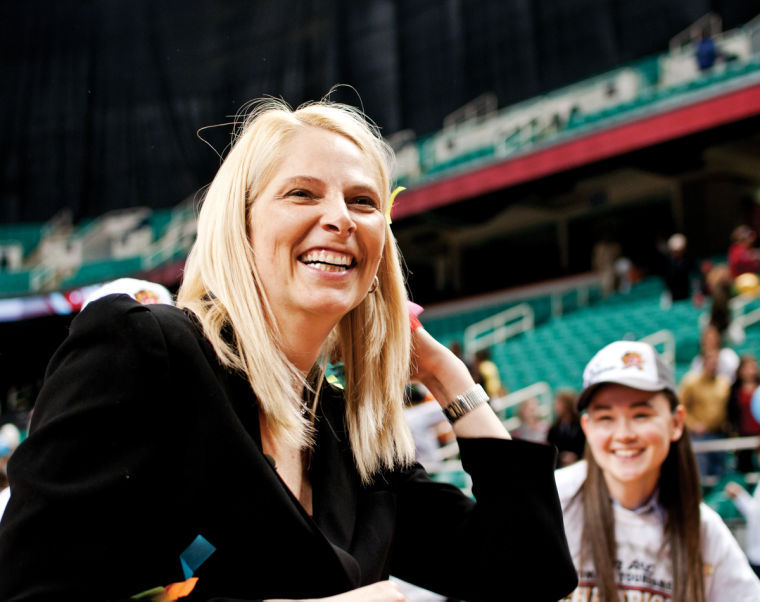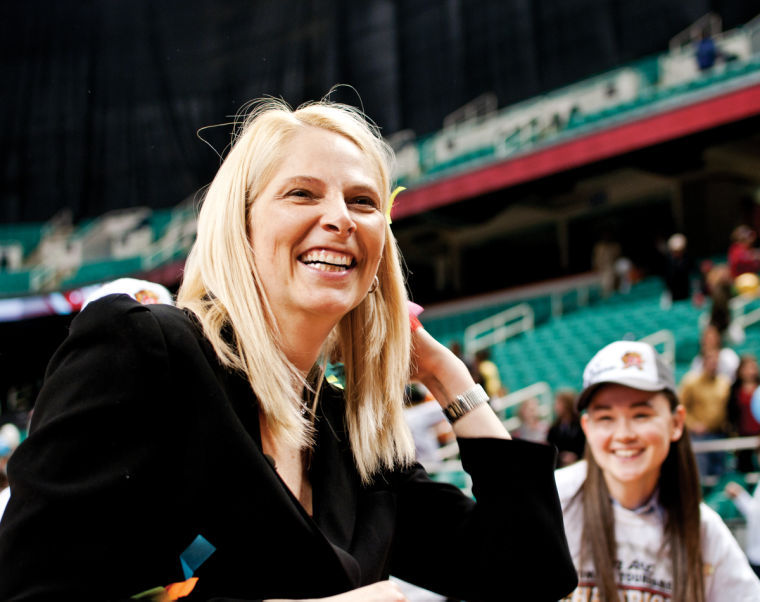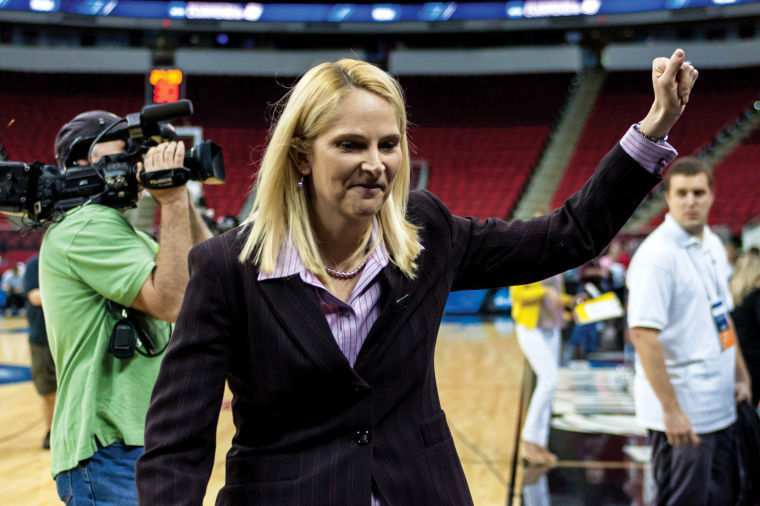FIVE YEARS AFTER she led her high school team to its first Iowa state championship, Brenda Frese’s basketball playing career was over.
Foot injuries hampered her at Arizona, and she needed four surgeries. Even after redshirting, she couldn’t complete a fourth season of eligibility. At 23 years old in 1993, Frese was forced to move on from playing.
For an intense competitor, it wasn’t supposed to end so soon. And yet the timing was perfect.
Frese still spent most of her time with the game that year at nearby Pima Community College in Tucson, Ariz. She scouted opponents and visited recruits as assistant coach of the women’s basketball team, and soon, the undergraduate started running practices by herself,organizing drills and explaining tactics to players who were nearly her age.
It didn’t happen often, but when Pima’s coach was too occupied with her second job, Frese got the chance to lead the team. By the end of the season, she gave her first locker room speech as a coach before coaching her first game.
“It all kind of helped lead me to now to help me as a coach,” Frese said. “My dad always told me when I was coming up and going through it, ‘It’s amazing what basketball can do for you in your life.’ And it’s been really, really good to me.”
She couldn’t salvage her college career, but that season marked the start of a journey in which she coached at six schools in 11 years. She reached the pinnacle of her sport when she led the Terrapins women’s basketball team to the NCAA championship in 2006, putting the program in the national spotlight and becoming one of the youngest coaches to win a title.
While the Terps have been consistent contenders since her 2002 arrival in College Park, Frese has had a multitude of changes in her personal life. She got married in 2005, gave birth to twin sons, Markus and Tyler, in 2008, and endured Tyler’s leukemia diagnosis in 2010.
But now, in her 12th season as the Terps’ coach, Frese has found stability.
In November, she signed a contract extension that will keep her with the Terps until at least 2021. Tyler reached a major stage in his recovery and received his final chemotherapy treatment in December. And after so many stops early in her career, she has developed an appreciation for the constancy that has come with the job.
“There’s been a lot of change, but you see with change, great things happen,” Frese said. “This area where we live, being able to coach at Maryland, the support we have — I just count my blessings because we love everything about being a part of Maryland.”
***
FRESE WAS INVOLVED IN BASKETBALL from an early age, but it didn’t consume her days growing up in Cedar Rapids, Iowa.
Swimming, volleyball, softball, track and field, golf, piano and trumpet all played parts in her childhood. Bill and Donna Frese introduced each of their six children to many activities, often encouraging them to pursue multiple hobbies as a release for their boundless energy.
“I had an awesome childhood,” Brenda Frese said. “I feel like all I can remember is playing.”
As the fourth child born in a family of five girls and one boy, Frese fully embraced her household’s competitive environment. Board games such as Monopoly and Life were as intense as pick-up basketball in the driveway. Frese enjoyed the competitive nature of sports the most, and as she got older,basketball became her main focus.
Other sports had drawbacks. The thought of 6 a.m. swim meets didn’t sound attractive, softball was too slow for her and track was only in season during the spring. Frese could play basketball all year, however, satisfying her desire to play a competitive sport frequently.
In addition to leagues and summer camps, Frese’s driveway became an ideal spot for Frese and her two younger sisters, Marsha and Stacy, to practice their jump shots or go toe to toe in one-on-one matchups. Bill Frese added a spotlight to the blacktop, allowing for nighttime sessions that went until 10 p.m. or later.
Brenda Frese played relatives during family gatherings, with the most memorable matchups coming against her uncles while she was in high school. On one occasion, she faced her godfather, who she said weighed 230 pounds at the time, and when he came down after a rebound, he elbowed her in the nose. It resulted in two black eyes, but Frese kept playing.
“That didn’t stop her from anything,” Donna Frese said. “She just didn’t look the best at all.”
As a forward at Washington High School in Cedar Rapids, Brenda Frese described herself as “fiery.”
“If someone scored on me, I took it personal,” Frese said.
As a senior, she led the Warriors to their first state tournament appearance since a championship game loss her freshman year. Though the team wasn’t expected to bring the title back to Cedar Rapids, Frese’s speech during a send-off party had an entirely different message.
In front of family, friends and fans in the community, the gutsy teenager guaranteed that they would bring the championship trophy back to Washington High School.
“I was kind of shocked,” Donna Frese said. “She was never an outgoing, showy person. She just kind of did her thing, and that was it.”
She followed through on her word, scoring 35 points in the Warriors’ first-ever state championship victory. With Marsha Frese also on the roster that season, the game remains one of Brenda Frese’s proudest moments as a player.
And after her final high school game, basketball took her more than 1,500 miles southwest to play for the Wildcats.
Things were much different in Tucson than in Cedar Rapids. Arizona had a combined 29-59 record in Frese’s first three seasons, while injuries prevented her from building on a solid sophomore year. After her third season, she redshirted, and the Wildcats hired a new coach. As Frese’s hopes to continue her playing career dimmed, watching locker room talks helped her discover a new passion within basketball.
“You know what?” Frese thought. “Maybe I can coach college someday.”
***
WHEN BILL FENNELLY left Toledo to take over Iowa State in 1995, he went without a coaching staff in hopes of rebuilding a historically subpar program from scratch in Ames, Iowa.
He was looking for young, enthusiastic assistant coaches who shared his ambition, and he knew where he would find the ideal candidate.
In the Mid-American Conference, Fennelly had already met Frese, who was an assistant coach at Kent State, and though they had never had an extended conversation, he constantly heard about her strong feelings for the game and hard-working mentality.
“When I got the job, she was one of the first calls I made,” Fennelly said.
Two years earlier, Frese sent a resume and cover letter to each school that mailed Stacy Frese recruiting letters to ensure her name was out there for teams to see. That process helped Brenda Frese get the job at Kent State.
But this time, a coach was reaching out to her. Fennelly offered Frese a chance to return to her home state as assistant coach and recruiting coordinator for the Cyclones.
Frese, modeling Fennelly’s selective style, developed a reputation as a relentless recruiter, a characteristic that remains one of her most noteworthy traits as a coach.
“For Brenda, it was never good enough,” Fennelly said. “It was always, ‘We can do more. We can make another phone call. We can write another letter. We can go see him.’”
In Fennelly and Frese’s first season in Ames, Iowa State had one of its biggest turnarounds in program history when it improved to 17-10 from 8-19. The next year, Stacy Frese transferred to Iowa State from Iowa, and the sisters — who are seven years apart in age — fulfilled their aspiration of sharing a sideline, something they had hoped for since they shared a room as kids.
Stacy Frese’s transfer was a boost for both the Iowa State program and Brenda Frese’s development as a coach. After sitting out a year as a transfer and watching Iowa State make its first-ever NCAA tournament appearance, Stacy Frese led Iowa State in scoring and earned All-Big 12 honors in three consecutive seasons playing for the Cyclones.
Brenda Frese closely monitored her sister during games. And if Stacy Frese got substituted, Brenda Frese would sit next to her on the bench and provide words of encouragement.
“It was kind of a unique relationship because, obviously, she knew me better than everyone else,” Stacy Frese said. “So she always knew — she still does — how to push the right buttons with her players, you know?”
Iowa State reached the second round and the Elite Eight of the NCAA tournament during those two seasons, respectively. But that deep postseason run was Brenda Frese’s last as an assistant coach. She left Iowa State in 1999 before her younger sister’s senior year and took over at Ball State for her first head coaching job.
Under Fennelly’s guidance, Frese helped transform a sputtering Cyclones program into one of the Big 12’s best teams in one of the most fruitful learning experiences of her career.
“By far had the biggest impact on my coaching,” Frese said. “To be able to be with Bill for four years and just learn how to build a program from the ground up.”
After six years of assistant positions at Division I programs, Frese finally had the opportunity to lead the rebuilding process of a program. But as the next four years showed, there were other opportunities to pursue.
***
GENO AURIEMMA AT CONNECTICUT, Pat Summitt at Tennessee and Tara VanDerveer at Stanford: This group of legendary women’s basketball coaches, Fennelly said, rose to prominence while staying with one program for an extended period of time, with each coach building their respective teams into national powerhouses.
Coaching three teams in four years, Frese was not like those three.
“Brenda’s path was a little more like a men’s coach,” Fennelly said. “You go to one place, then you move up.”
She won Mid-American Conference Coach of the Year in her first season with Ball State when the Cardinals went 16-13, then Ball State’s record improved to a then-program-best 19-9 in her second year.
She left Muncie, Ind., after that season to coach Minnesota, which was coming off a dismal 8-20 season in which the Golden Gophers won only one conference game.
Minnesota went 22-8 and 11-5 in the Big Ten during Frese’s only season in Minneapolis in 2002. The Golden Gophers reached the second round of the NCAA tournament, and the Associated Press voted Frese the National Coach of the Year.
Frese’s three years of head coaching experience was enough to persuade then-Terps athletic director Debbie Yow to bring her to College Park.
“There is an old Southern saying that describes why we targeted Brenda, which goes like this: ‘If a dog is going to bite you, he’ll bite you as a pup,’” Yow wrote in an email. “That simply means that young professionals will provide indications early in their respective careers of their abilities. Brenda did that coaching at Ball State first, followed by Minnesota.”
Yow hired Frese the same day the men’s basketball team won the 2002 NCAA title. It would be only four years until she led the women’s team to one of their own, but that didn’t seem likely during her first season.
For the first time in her coaching career, she finished a season with a worse record than the year before. The Terps went 10-18 and didn’t get to compete in postseason play, but as she did with Fennelly at Iowa State, she began building the foundation for an improved program.
It started with recruiting guard Shay Doron during that tough first season, then forwards Laura Harper and Crystal Langhorne the next year. Finally, Frese signed forward Marissa Coleman and guard Kristi Toliver during her third season. With Frese’s five big signings leading the way, a young Terps team that had only one upperclassman starter won the NCAA Championship in 2006.
“So much sometimes in life is luck and timing, and when you can put your work ethic, and it kind of all comes together,” Frese said. “There’s just different coincidences that end up having to happen.”
***
ON MONDAY, MARCH 17, the Terps — players and coaching staff alike, each wearing a yellow, long-sleeved Maryland shirt and black warm-up pants — were seated in Comcast Center’s Heritage Hall watching a wall-mounted television. Frese sat front and center with Markus and Tyler sitting on her lap.
Alongside parents, friends and media members, the Terps were waiting for their seed to be called during the NCAA tournament selection show on ESPN. After the team’s seed appeared on the screen, Frese got up and talked to reporters before chatting with the parents in attendance.
Balancing life as a coach and a mother has become second nature for Frese. But there are also times when she is fully focused on her two boys.
“She takes advantage of every waking moment,” said Mark Thomas, Frese’s husband. “She may work until after midnight, but she’s up at 6 a.m. to be up with the boys and spend time with them before they go off to school.”
Unlike in the first half of her coaching career, Frese isn’t as focused on what comes next. There’s always the big picture pursuit of another national championship, but through Tyler’s bout with leukemia, she has learned to appreciate the little moments in life.
And in a hectic job with long hours and distant travels, Frese can always return to the stability in her life.
“In a weird sort of way, it kind of helped me to slow me down, if that makes sense, and appreciate more of the now and the moment and the present.” Frese said. “I’ve always been out ahead of things and task-oriented. I am to a degree, but I’m more in the precious moment now.”





